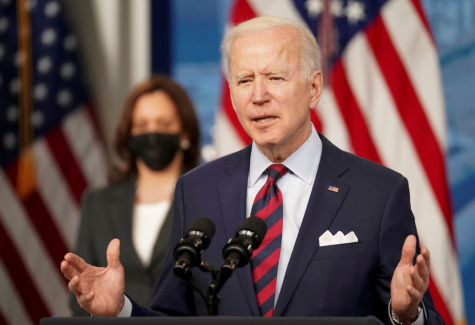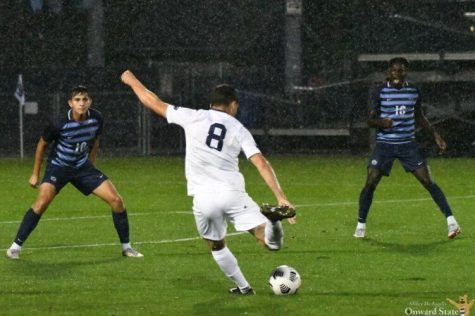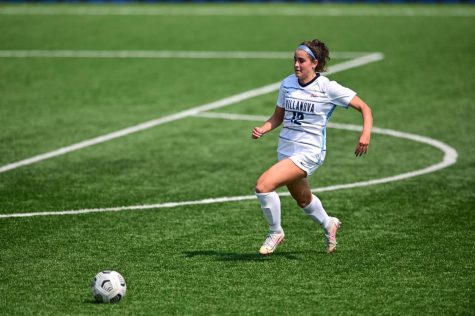Students Prepare to Study Abroad in Fall 2021
Courtesy of Villanova University
University students put their V’s up at a Summer Asia Internship Program in Shanghai before the COVID-19 pandemic.
August 19, 2021
After nearly a year-and-a-half of pandemic-related restrictions, Villanova University students are now set to study abroad for the Fall 2021 semester. This marks the first time that University students will be away at such programs since March 2020, when students were forced to return to the United States at the onset of the global coronavirus outbreak.
As of August 12, just 27 University students are set to study abroad in Fall 2021. While Villanova is no longer holding study abroad programs of its own this fall, the University has approved student participation in seven different partner programs in five European countries: the United Kingdom, Spain, Italy, the Czech Republic and Denmark. There were originally about 50 students set to go abroad in the fall, but after cancellations and postponements, the University seems to be down to its final 27 students.
The Office of Education Abroad has worked tirelessly to ensure that students could have the opportunity to study abroad this fall. The Villanovan spoke with Elizabeth Campanella, the Director of the Office of Education Abroad, for more information.
“Early last fall we began work on a plan to allow for Summer 2021 study abroad,” Campanella said. “Once it was clear that faculty-led summer programs were not going to happen, the planning process shifted exclusively to focus on fall study abroad. There were a number of new challenges and changes that continued to throw us curve balls throughout the spring as we were planning, including changes to the U.S. Department of State Travel Advisory guidance.”
The main developments that have impacted the feasibility of global travel over the past few months have been the steady rise in global vaccination rates and the simultaneous rise of the SARS-CoV-2 Delta variant. The Delta variant is more than twice as contagious as previous COVID-19 strains and potentially may cause more severe reactions. However, as with previous strains, the Delta variant seems to have barely any effect on fully vaccinated people. In the five countries where Villanova students will be studying abroad (the United Kingdom, Spain, Italy, the Czech Republic and Denmark), the rates of fully-vaccinated residents are about 60%, 62%, 57%, 49% and 63%, respectively, as of August 11. Many more residents in each country have received at least one dose and are expected to be fully vaccinated soon.
One issue that has remained throughout 2021 is increased caution related to higher travel advisory levels.
“In pre-COVID times, the University maintained a policy that students were not permitted to travel or study in locations that were rated Level 3 or Level 4 by the U.S. Department of State Travel Advisory system,” Campanella said. “Traditionally, these were not locations where our students wanted to study anyway, and a Level 4 country rating usually implied a failed state or war-torn country. With changes to the U.S. Department of State Travel Advisory system, the CDC (Centers for Disease Control and Prevention) COVID-specific travel health notices are now more heavily weighted in the calculation of individual country ratings. This means that locations that were traditionally Level 2 locations were now rated at Level 4 just because of increased COVID cases in a location.”
As a result, the University has adjusted its standards this year in order to allow students to embark on their international programs.
“This rating system was no longer a useful primary tool for evaluating the individual location and it was a challenge to develop a different way to evaluate locations and programs that could provide the support and resources for our students throughout the semester abroad, especially with COVID concerns in mind,” Campanella said. “At this time, Villanova is not offering any of our own programs in any locations rated DOS (Department of State) Level 3 or Level 4, but we have been able to identify semester partner programs that will provide the onsite support needed during COVID times. The University still does not encourage or recommend travel to Level 4 locations, but for the fall semester, students have not been prevented from choosing to go, as long as the Level 4 risk is clearly only ‘due to COVID’ and students are participating in an approved partner program.”
The Villanovan spoke with some students to hear their thoughts about studying abroad this fall.
Kendall Hayes, Class of 2023, is set to study abroad as part of the Boston University London Internship Program. She was notified that the program was officially approved on July 11.
“I am beyond excited that I am able to study abroad in just a few weeks,” Hayes said. “After so much back and forth, I am looking forward to just enjoying my time in London and making the most of this life-changing experience.”
Sophia Pedro, Class of 2023, is set to study abroad in the WFI United Nations Internship program in Rome, a program in partnership with IES (Institute for the International Education of Students). Unlike Hayes, Pedro wasn’t informed about her program being officially approved by Villanova University until mid-August, less than a month before she must depart for Italy.
The University initially claimed to have a decision on the program by the end of June.
“No decision came. They followed up with an email saying they were still assessing the risk and we would know by the end of July,” Pedro said.
Once again, at the end of July, there was still no official decision. However, on August 12, the University finally officially approved the Rome program.
“This whole process has definitely been stressful and confusing,” Pedro said. “Despite all the frustrations, I still am very excited and hopeful to be working and studying in Rome. I’m very grateful for the opportunity.”
Restrictions that students must abide by while abroad depend on the country and school. For example, Italy has instituted a green pass system.
“Essentially, it’s physical proof that you are vaccinated and have had a valid negative COVID test within the country,” Pedro said. “This pass is mainly used to visit restaurants, museums, sporting events, pools, gyms and other public places. In indoor spaces where social distancing isn’t as feasible, there are still mask restrictions, but everything is constantly evolving.”
The presence of University students studying abroad in Fall 2021 is a positive sign for those looking to do the same in Spring 2022 and in other semesters to come. Of course, the study abroad situation for Spring 2022 is still uncertain.
“I think the only thing that is certain is that the students interested in studying abroad will need to be flexible and willing to adapt their plans as needed,” Campanella said. “Locations and programs may be still limited and might even change as we move through the fall semester. We are regularly updating a Spring 2022 study abroad website for students who are interested in pursuing the spring abroad to learn more.”
The Villanova community looks forward to hearing about the experiences of fellow Wildcats as they spend their next four months in Europe.













